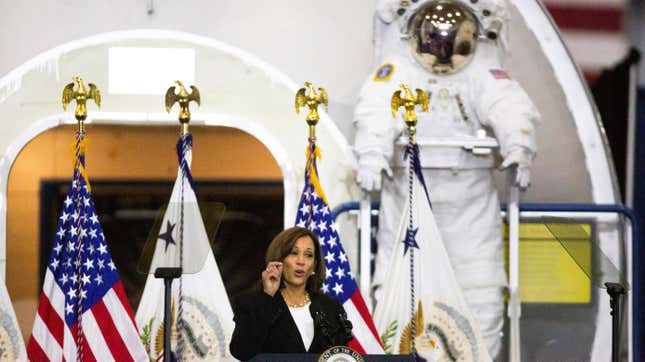
While speaking at the National Space Council meeting on Friday, Vice President Kamala Harris announced that the U.S. will introduce a resolution at the United Nations General Assembly to call on other countries to refrain from conducting anti-satellite missile tests.
Harris announced the self-imposed ban on anti-satellite (ASAT) missile tests at Vandenberg Space Force Base in April, vowing that the U.S. would no longer conduct the tests. The U.S. is now hoping that other nations will join suit in banning the ASAT missile tests worldwide.
“This April, I announced that our nation would not conduct destructive, direct-ascent, anti-satellite missile testing,” Harris said on Friday. “And later this month, the United States will introduce a resolution at the United Nations General Assembly to call on other nations to make the same commitment.”
The move to ban ASAT missile tests may be a sign that the U.S. is growing increasingly worried about its assets in space, especially with ongoing tensions between the U.S. and Russia.
Last November, Russia conducted a reckless test of its own, destroying an old satellite with an ASAT missile. The test created hundreds of pieces of space debris in the process, forcing astronauts and cosmonauts aboard the International Space Station to seek shelter. About two months later, the debris also threatened a Chinese satellite, coming as close as 48 feet (14.5 meters) to the Tsinghua science satellite. NASA condemned Russia’s ASAT missile test, calling it “reckless and dangerous.” The space agency’s administrator Bill Nelson issued a statement at the time saying: “All nations have a responsibility to prevent the purposeful creation of space debris from ASATs and to foster a safe, sustainable space environment.”
Relations between Russia and the U.S. haven’t been this bad since the end of the Cold War. In February, U.S. President Joe Biden declared that the international sanctions imposed against Russia would also impact its space program, stating that sanctions would “degrade their aerospace industry.” Russia has continuously threatened to pull out of the ISS and even revealed a model of its own space station to rival the current one—a partnership between the two nations that dates back more than 20 years. Both sides also seem to be curious about the other’s spaceflight agenda, with Russia recently launching a spy satellite to possibly stalk a classified U.S. military satellite.
It’s not surprising that the U.S. is feeling increasingly vulnerable and wanting to better protect its assets in orbit. But will other nations feel the same way? Both China and India have performed ASAT tests in the past and it’s hardly a guarantee that these two nations, along with Russia, will agree to the proposed U.N. resolution. Sadly, the U.S. has the most to lose when it comes to losing its assets in space, making it unlikely that a unanimous decision will be achieved when this resolution reaches the General Assembly later this month.
More: The FCC Wants a 5-Year Deadline to Deorbit Defunct Satellites